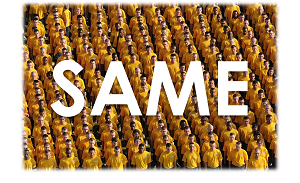 If everybody is thinking alike, then somebody isn't thinking.
If everybody is thinking alike, then somebody isn't thinking.
- General George S. Patton, Jr.
Whenever you find yourself on the side of the majority, it is time to pause and reflect.
- Mark Twain
People like consensus; it naturally feels good when everyone agrees on something. And there's nothing inherently wrong with consensus, especially if it comes after a protracted debate. Where consensus is a problem is when it means, as both General Patton and Mark Twain point out, we just go along with the majority opinion. The reason this happens is often complex and a topic for another time, so today let's focus on what to do about it.
The key is to notice when it's happening. You've almost certainly been in a meeting or involved in a discussion where someone proposes an idea (especially if it's the boss), and everyone just nods and agrees. No questions are asked, no suggestions for improvement are given, and no alternatives are posed. This happens all the time so we don't think much of it, but it should be a surprising situation: very rarely is a new idea so entirely without fault that no one would have any objections to it or suggestions for improvement. So if you're the one proposing the idea or if you're listening to it and everyone instantly agrees, red flags should go up telling you slow down.
Once this has happened, the easiest thing to do is ask questions. You can play "devil's advocate" with the group or with yourself, depending on the situation. Often, asking "what other ideas do you have" doesn't work well in terms of brainstorming, so ask questions like:
- How confident are we that this idea works?
- What potential pitfalls are there with the idea?
- Have we done enough pre-work/research into the idea?
- If you had to make one tweak to the idea, what would it be?
- If price/cost were no option, would we still go with this idea?
- If the price/cost needed to be cut down even further, how would we make that happen with this idea?
- What impact will this idea have on our day-to-day operations?
- How will we measure the success of this idea?
Depending on the importance of the topic, this discussion might take a few minutes, or it might take days or even weeks. The point is to get people to critically consider the idea on the table, which often forces us to suggest improvements and alternatives, which is what we ultimately want. Then, once those are discussed and we land on a consensus, we can feel good that it's a true agreement and the best option for us at that time.


